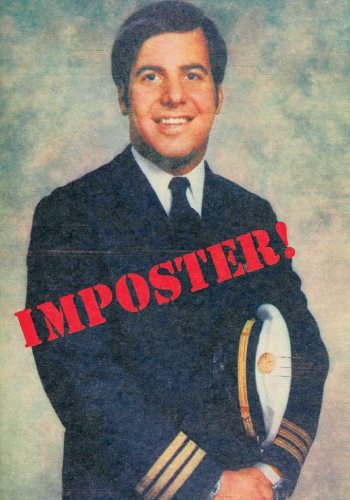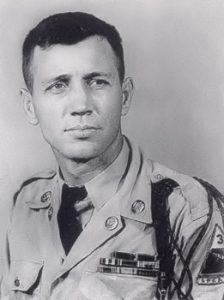You may not be familiar with the name Frank William Abagnale (ah-Big-Nail) Jr., but if you’ve seen the movie Catch Me If You Can, starring Leonardo DiCaprio and Tom Hanks, you have seen a glimpse of his life story. While the movie, directed by Steven Spielberg, was embellished for cinematic value, the tale of Frank Abagnale Jr.’s transformation from conman to a leading fraud expert is based on real-life events.
Frank Abagnale Jr. was born in 1948 to Frank and Paulette Abagnale in Bronxville, New York. Frank had what would be considered a good childhood; he had a stable home, with loving and attentive parents. Every night, his father would tell him, “I love you” and kiss him good-night. Frank describes himself as having a daddy in a world of fathers.1 Not the typical upbringing of someone who would land on the FBI’s Top Ten Most Wanted list. While most fifteen to twenty year olds are graduating high-school, going off to college or joining the work-force, Frank traveled the globe, committing forgery, check fraud, and eventually serving time in prison.
Frank’s life of crime started when at fifteen Frank committed credit card fraud against his father. Frank Sr. had given his son a credit card to purchase supplies for his car. Frank devised a scheme with the gas station attendant to fraudulently bill Frank Sr. for merchandise in return for cash, which he used to fund his dating life. It was not until Frank Sr. received a bill for several thousand dollars of merchandise that the crime was discovered.2
During Frank’s adolescent years, his parents’ marriage deteriorated, and ultimately they decided to divorce. The divorce was keep secret from the Frank Jr. until the day of the divorce proceeding. Frank was summoned from school to the court house. The judge presiding over the divorce asked sixteen-year-old, Frank Jr. to choose the parent with whom he wanted to live. Unable to choose between his parents, Frank ran away in tears, fleeing to Manhattan, New York.3
Upon settling in New York, Frank got a job where he earned a measly $1.50 per hour, which was minimum wage at the time. Believing his meager wage was the result of his age, Frank alters his driver’s license, changing his birth year from 1948 to 1938. Frank had always appeared older than his age; he was six foot tall and had premature graying of his hair, so he was able to pass for a twenty-something year old with ease.4 Unfulfilled and making just over minimum wage, Frank turned to check fraud to supplement his income. Frank’s early scheme was rudimentary; he would open bank accounts in his own name, overdraw the account and disappear when the bank demanded repayment. Initially, Frank passed checks in the amount of $25-$50.5

With little thought of the consequences, Frank devised a plan to pass checks on a much grander scale by posing as a pilot. In his biography, Catch Me if You Can, Frank writes, “Why, I thought, I could walk into any hotel, bank or business in the country and cash a check. Airline pilots are men to be admired and respected. Men to be trusted. Men of means. And you don’t expect an airline pilot to be a local resident. Or a check swindler.”6 In order to execute his plan Frank first needed to look the part. Frank contacted Pan Am Airlines claiming to be a pilot who had lost his uniform. Frank was able to con his way into getting a replacement uniform for a nominal fee, which was billed to the airline. Frank used the uniform to assume the identity of a Pan Am pilot.7 In addition to passing checks in much higher dollar amounts by posing as a pilot, came the perk of being able to fly for free, known as deadheading. While Frank never flew on Pan Am, he did deadhead on other airlines, allowing his check fraud scheme to span the globe.8
Frank Abagnale was a master of deception; he was able to change his identity and persona with ease. Over the course of five years, Frank had impersonated a physician, a lawyer, and a sociology professor.9
“Frank Abagnale as a physician. | Courtesy of reelrundown.comFrank’s impersonation of a doctor was not intentional; he was asked for his occupation in the process of completing a rental application, in which he answered “pediatric doctor.” Unbeknownst to Frank, an actual pediatrician lived in the same complex. Unable to avoid the pediatrician, Frank toured the local hospital, and used its library in order to add legitimacy to his claims. Frank did not perform any actual medical procedure, realizing that doing so could have life-and-death consequences. Frank abandoned that persona and left the area.10
Frank moved on to Louisiana, where he posed as a lawyer. During his time posing as a lawyer, Frank passed the state’s Bar exam. At the time, the state of Louisiana allowed testers three attempts at the exam. Frank used the process of elimination and on his third attempt, successfully passed the Louisiana Bar exam within nine weeks. A remarkable feat considering at the time Frank had only a tenth-grade high school education.11
From 1964 to 1969, Frank assumed many identities. He is alleged to have stolen 2.5 million dollars, and traveled over a million miles as a deadhead for which Frank was landed on the FBI’s Top Ten Most Wanted list. Frank was actively pursued by the FBI, state and local law enforcement from the time he was sixteen until his capture at twenty years of age.12
At the age of twenty, Frank found life on the run exhausting and decided to retire to France. Frank settled in Montpellier, the town his parents met in at the end of WWII. While grocery shopping, Frank was recognized by the stewardess ex-girlfriend, who had seen his wanted poster. The ex-girlfriend alerted police of his presence. Frank’s elaborate game of cat and mouse came to an end when he was arrested by Montpellier Police on an Interpol warrant for crimes committed in Sweden.13 At the time of his arrest Frank was wanted in every state in the United States and for extradition in twenty-six other countries. France refused to honor the Interpol warrant, and instead tried Frank for crimes committed in France. After a two-day trial, Frank was found guilty of forgery and sentenced to a year of prison in Perpignan’s House of Arrest.14
Frank served six months of his year-long sentence at the Perpignan Prison. While in prison, Frank encountered horrific conditions. His small cell has no electricity, toilet, or wash basin, and he had only a hole in the floor to relieve himself. Frank entered Perpignan Prison a 198 pounds and left severely malnourished, weighing only 109 pounds.15 At the end of six months, Frank was transferred to a prison in Sweden, to serve the remainder of his sentence. While in Sweden, Italy submitted an extradition request. However, the judge in Sweden instead worked with the FBI to have Frank’s passport revoked, in order to have him deported to the United States.16 Frank Abagnale served five years of his twelve-year sentence. He was released on the condition that he help the FBI investigate fraud and scam artists without pay, to which he agreed. Frank continued to work for the FBI without pay even after fulfilling his sentencing requirement. Frank also repaid the stolen 2.5 million dollars, despite it not” being a term of his parole or probation.

After his release, Frank approached a bank with an offer to lecture its staff on how to spot tricksters and fraudulent checks. It is this work that Frank finds he has more value serving as a security expert than he had as a criminal. He works today as a security consultant, offering his advice and expertise to banks, law enforcement agencies and others. “More than 14,000 financial institutions, corporations, and law enforcement agencies use his fraud protection programs.” Frank still consults with the FBI, without payment of services or reimbursement of travel expenses.17
It is evident in his storytelling that Frank does not want to be immortalized for the actions of his teenage years, but for the family he has raised since. He credits his wife and three sons as his greatest accomplishment. Frank’s transformation from conman to leading security expert is an inspirational tale of someone who made a mistake, learned from it, and used that knowledge to contribute to building a better society.18
- Jenna Scafuri, “General Session,” Corrections Today (December 2011): 68-70. ↵
- Sandy Lawrence Erdy, “Criminally Entertaining: The Imposter Behind Catch Me If You Can,” Biography, (January 2003): 26. ↵
- Frank Abagnale, bioCatch Me If You Can Author Frank W. Abagnale Speaks at Clarkson University,” Clarkson University, 16 July 2013, Clarkson University, Potsdam, NY. ↵
- Sandy Lawrence Erdy, “Criminally Entertaining: The Imposter Behind Catch Me If You Can,” Biography, (January 2003): 26. ↵
- Frank Abagnale, “Catch Me If You Can Author Frank W. Abagnale Speaks at Clarkson University,” Clarkson University, 16 July 2013, Clarkson University, Potsdam, NY. ↵
- Frank W. Abagnale, Catch Me If You Can (New York: Broadway Books, 1980), 42. ↵
- Frank W. Abagnale, Catch Me If You Can (New York: Broadway Books, 1980), 42-44. ↵
- Jenna Scafuri, “General Session,” Corrections Today (December 2011): 68-70. ↵
- Frank W. Abagnale, The Art of the Steal (New York: Broadway Books, 2001), 3. ↵
- Frank Abagnale, interviewed by Sarah Montague, BBC Hardtalk, March 15, 2003. ↵
- Frank Abagnale, interviewed by Sarah Montague, BBC Hardtalk, March 15, 2003. ↵
- Frank Abagnale, “Comments,” September 2002, http://www.abagnale.com/comments.htm ↵
- Patrick Lynch, “Catch Me If You Can: The Real Story of Frank Abagnale, Jr.” History Collection, July 2017, http://historycollection.co/catch-can-real-story-frank-abagnale-jr/ ↵
- Patrick Lynch, “Catch Me If You Can: The Real Story of Frank Abagnale, Jr.” History Collection, July 2017, http://historycollection.co/catch-can-real-story-frank-abagnale-jr/ ↵
- Frank Abagnale, interviewed by Sarah Montague, BBC Hardtalk, March 15, 2003. ↵
- Olivia Solon, “Frank Abagnale on the Death of the Con Artist and the Rise of Cybercrime,” Wired, February 2017, http://www.wired.co.uk/article/frank-abagnale ↵
- Stephanie Hunt, “Bona Fide*,” Charleston Magazine, September 2010, http://charlestonmag.com/features/bona_fide#. ↵
- Frank Abagnale, interviewed by Sarah Montague, BBC Hardtalk, March 15, 2003. ↵



56 comments
Nathan Alba
To think someone my age had been assuming multiple identities and stealing millions of dollars is just crazy to think of. However it mus have been an exhilarating rush while on the run, in the end he did get caught. Not only that, but he did all of this with a 10th grade education? Frank must have been either pretty smart, or the Louisiana bar exam must really not be all that difficult. Either way I did like how the article ended, seeing someone go from FBI’s most wanted to a bank security consultant is really the American dream.
Reagan Meuret
I think everyone can love a good story like this. I never knew about Frank Abagnale, but I’m glad this article was so good at informing me who he is! It is really cool to see a man that used the knowledge for stealing millions of dollars, to turning it around and using it for good. I hope some cons in prison come across his story and realize they can still do good an contribute positively to the world.
Janelle Larios
I watched the movie and I had never known that it was based on a true story. I was always thought the movie was great and Leonardo DiCaprio’s and Tom Hanks acting was so good. I think those to people made the movie come alive. Although I was very surprised when I read that Frank Abagnale repaid the $2.5 million dollars and still continues to help and assist the FBI, without pay or reimbursement. I also find it surprising that his ex-girlfriend found him in France and ratted him out. I thought it was a very unlucky day.
Marina Castro
When I read this type of story, I always wonder what would have happened if this person had used his talents for the good. It is very clear that Frank was a smart guy, who was able to find his way through the law. Individuals like him could have such an important role in society because of how clever he is.
Dylan Coons
I remember watching the movie and seeing a few of his public talks a while ago. It’s pretty amazing what you can do by simply acting as if you belong. It’s something that really interests me because of my work in cybersecurity. I think most people are surprised that he ended up working with the FBI. But, how else would the FBI catch people like Frank? Frank will live on as one of Americas greatest anti-heroes. He’s the type of guy you hope never gets caught and makes you wish you were as clever as him.
Kaitlyn Killebrew
I had seen Catch me if You Can so when I saw the name Frank Abagnale, I knew what I wanted to read. It’s not uncommon for criminals to be created because of traumatic childhoods, but for him to run away from home at fifteen because of his parents divorce to then start working for $1.50, is a phenomenon to people in the twenty-first century. It’s pretty impressive that he was smart enough to trick banks into overdrawing as well as passing the Louisiana States Bar Exam (with only a tenth grade education) but still have enough moral to say posing as a doctor is wrong as well as illegal. To me that was confusing. H e posed as pilots, professor, but he wouldn’t go through with physician? So it’s far to say that he had some morals, and we can further back that up when he later talks about helping the U.S government into helping them learn the tricks of con men and paying back the money he stole, which was not required nor was it part of his sentences.
Enrique Segovia
When I read the title of the article, the name Frank Abagnale rang a bell in my brain… I just could not remember where I had heard it. Until I started reading the article which had left me intrigued with that infamous name, I saw that this article expounds the story of the main character of the movie Catch Me If You Can, with Leonardo DiCaprio and Tom Hanks. Instantly, I felt connected to this article and throughout it, I was constantly reminded of the astonishment I felt when I watched the movie upon Abagnale’s genius and trickery skills. The article follows an order that directs Abagnale from a criminal to a man who helps banks prevent check frauds. Frank Abagnale’s story works as proof that many people use their talents for injustice, but as Abagnale, they can be enlightened and use these specific talents to help the world out.
Peter Coons
Abagnale has a sort of romanticized antihero aura around him. His crimes did not directly affect normal citizens. Rather, he used loopholes and trickery to play the system to his advantage at the expense of corporations and banks. In reality, these companies saw little to no actual loss at the hands of Abagnale, and Spielberg drove that home in the film. As for the actual man, I think Frank is somewhat remorseful for what he did in his youth, and in a way of returning his stolen goods to the private sector, he shows them how to catch cons like him. However, given the opportunity, I think frank most definitely would con again.
Miguel Rivera
I have never watched the movie that portrays him, but I am glad to have read this article first because it shows me more than a movie would have. I truly enjoyed reading the impact he has now not as a criminal but as someone who has learned from his mistakes, and is assisting those who need help in identifying possible fraud. Key takeaway from the article is not that it’s okay to commit crimes and make it into a movie with two great actors, but that it is never too late to change your ways and give back to the society with good and kindness in your heart.
Robert Freise
The story of Frank Abagnale is very interesting. The way he used his intelligence to operate such a plan of forging checks and acting like a pilot to becoming one of the biggest faces in American crime history. The transformation of a criminal to a FBI investigator for fraudulent checks is incredible. The movie starring Leonardo DiCaprio gave me a better insight on how his work was made possible.